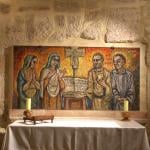Throughout the Pentateuch and into Joshua, the land of promise is a land “flowing with milk and honey.” After that, the phrase virtually disappears. It is used in the prophets to describe the land given to Israel after the exodus (Jeremiah 11:5; 32:22; Ezekiel 20:6, 15; the partial exception is the “curds and honey” in Isaiah 7:22). Why? Hippolytus may give us a clue. He describes an oblation of milk and honey alongside the oblation of wine; the milk and... Read more















